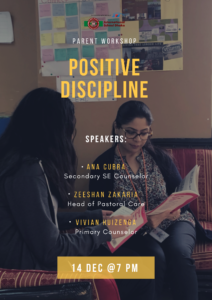Positive Discipline
In order to further support our community, the counselors and pastoral care hosted a parent’s webinar on Positive Discipline December 14 for the secondary community. Thank you to all the parents who attended the workshop. We understand the importance of sharing the positive discipline practices we use in school as teachers with our parents.
These tools provide strategies for a more harmonious relationships while guiding our children through difficult times. A workshop for primary parents is currently being planned for January after the winter break. Early years will has already received some tips and supports via Seesaw.
During the secondary parent webinar, parents shared examples of challenging situations at home as well as what attributes they hoped their child would have in 10 years from now. Ms. Ana Cubra, secondary counselor, and Ms. Vivian Huizenga, primary counselor, shared personal stories and provided research-based advice on how to use positive discipline and how to bring out the characteristics parents desired for their children.
Key points of this workshop were:
- Reward versus punishment to encourage teens to do what is expected
- To recognize ALL progress, no matter how small
- How to actively listen to your teen and the importance of communication
Participants walked through a demonstration of what we say to our children now, how that can feel to the child, and modeled positive things to say to encourage them to work hard, try their best, and build their confidence.
The premise of the positive discipline model is to help people find a sense of belonging and significance following these FIVE CRITERIA:
- Helps children feel a sense of connection. (Belonging and significance)
- Is mutually respectful and encouraging. (Kind and firm at the same time.)
- Is effective long-term. (Consider what the child is thinking, feeling, learning, and deciding about herself/himself and her/his world – and what to do in the future to survive or to thrive.)
- Teaches important social and life skills. (Respect, concern for others, problem solving, communication, and cooperation as well as the skills to contribute to the home, school or larger community.)
- Invites children to discover how capable they are. (Encourages the constructive use of personal power and autonomy.)
Feel free to check out the Positive Discipline websites for more information and details including videos of how the powerful tool works! www.positivediscipline.com
Ana Cubra, Secondary Counselor
Vivian Huizenga, Primary Counselor





